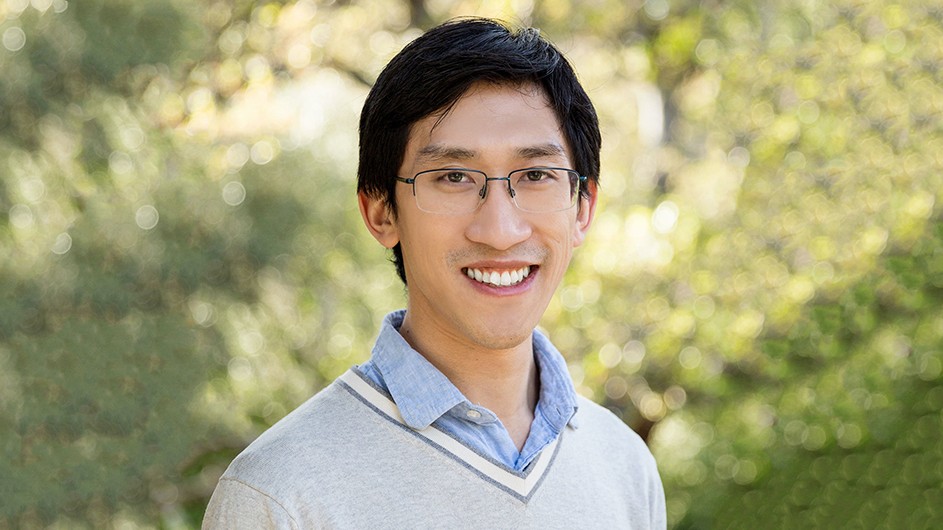Untangling Quantum Information at Columbia
Meet Henry Yuen, a computer scientist exploring the boundaries between classical and quantum computers. Yuen joined Columbia Engineering as an assistant professor in January 2021.

Modern electronics are based on binary digits, or bits. These are the most basic unit of information and are represented by one of two values: a one, or a zero. Start grouping bits together into bytes and you’ve got yourself a computer to crunch, store, and retrieve data.
But as powerful as modern computers have gotten, storage is only so big and calculations can only be performed so fast when you’ve got just two values to work with. Quantum physics, the theory that explains how the world works at the smallest scales—the level of molecules, atoms, and subatomic particles—has the potential to exponentially speed computers up. Theoretical computer scientist Henry Yuen wants to explain how.
Yuen joined Columbia this past January from the University of Toronto. He’s been hooked on physics since an elementary school librarian introduced him to a biography of Albert Einstein. “I was enthralled to read about someone who could make such a big difference in the world just by being deeply imaginative and thinking very hard,” Yuen said.
He was intrigued early on that you could program, not just play, video games, which led him to consider a career in the gaming industry. But as he meandered between physics and computer science at the University of Southern California, he came across a subject that combined both: quantum computing. “Quantum computing was the perfect subject for me," he said. "It gave me a way to think about physics and computer science at the same time.”
Quantum Science at Work
Yuen is now a computer scientist working on the theory of quantum computers, but that’s only part of the quantum computing story. When it comes to quantum computers, he explained, there are two issues. First, how do you build one? And second, what do you do with it?
His main work, which focuses on developing the theoretical foundations to explain what makes a quantum computer different from a classical one, gets at the second question. He is exploring how strange concepts like quantum entanglement between distant particles—what Einstein called "spooky action at a distance"—and quantum complexity theory can influence the capabilities, and limitations, of quantum computers.
Quantum computers will be built with quantum bits, or qubits. Thanks to a quantum property called superposition that says particles can occupy multiple states, qubits can be both one and zero…at the same time—a fact that blew Yuen’s mind when he first encountered it on a Wikipedia page in the early 2000s but is accepted by scientists as just the way the world works.
That those superpositioned qubits can become entangled with one another exponentially increases their computing power compared to what is possible with classical bits, but scientists are only just beginning to understand quantum entanglement. By building the frameworks that explain how qubits function and interact with one other, we can figure out how to design algorithms that take advantage of quantum computing power, Yuen said. The work also has big implications for cybersecurity, as the massive computing potential of qubits may necessitate a rewrite of most modern cryptography methods designed to keep our digital information (mostly) safe and secure.
Yuen’s research is at the forefront of computer science. “He has done celebrated work on deep and important questions in the theory of quantum computing,” said Rocco Servedio, professor and Former Chair of Columbia’s Department of Computer Science. “It's great to have him as a member of the quantum computing and theoretical computer science research communities here at Columbia.”
Theory Meets Experiment
Yuen also looks forward to collaborations outside of the computer science department, with the experimentalists at Columbia who are working toward that first problem: building quantum computers. A few buildings away, physicist Sebastian Will’s lab studies ultracold atoms that may one day serve as qubits in quantum computers and other devices, like quantum sensors.
“These technologies rely on our ability to prepare complex, entangled quantum states,” Will said. “But, in experimental reality, one of the hardest things is to know whether the quantum state you think you prepared is the quantum state that you actually prepared. This kind of verification has been incredibly hard in the past.”
Here, Yuen’s theoretical work on quantum entanglement may help experimentalists design more efficient protocols to check if the quantum systems they are working with are behaving as intended. “Henry is really leading the way in making quantum state validation a practical reality. This is a key ingredient to the success of future quantum technologies, and really, the importance cannot be overestimated,” Will said.
“Henry is really leading the way in making quantum state validation a practical reality," said Columbia physicist Sebastian Will.
When Yuen’s not at his whiteboards, you might find him in the recording studio. Last December, he helped launch Nonlocal: a quantum computing podcast. Geared toward the “quantum curious,” Yuen and his co-hosts, Vincent Russo and William Slofstra, take listeners behind the scenes of quantum computing through conversations with other researchers. Nonlocal is loosely modeled on My Favorite Theorem, a podcast in which mathematicians talk math.
As New York City opens back up, Yuen said he's ready to explore beyond Columbia's gates: the food, the shows, the music, and maybe, if he finds the time, a little blues and swing dancing to take the mind off those spooky particles dancing around the universe.